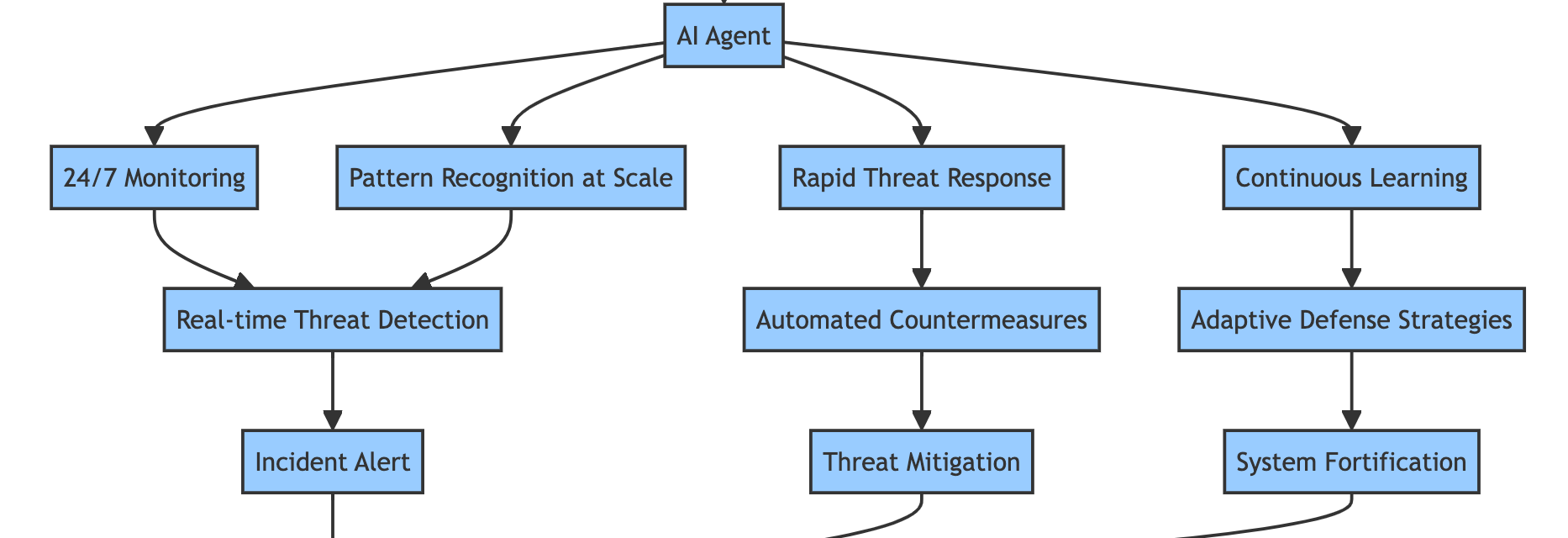Human vs AI Agents in Cybersecurity: Who Should Guard Your Data?
In the battle against cyber threats, should we trust human experts or AI agents to protect our valuable data? Explore how AI's tireless vigilance, pattern recognition, and rapid adaptation are reshaping cybersecurity.

In the ever-evolving landscape of cybersecurity, we face a pivotal question: Should we entrust the protection of our most valuable data to human experts or artificial intelligence (AI) agents? As cyber threats become increasingly sophisticated, this decision carries more weight than ever. Let's dive into this complex issue, exploring how AI agents might just be the guardians we need in the digital age.
The Human Touch: A Double-Edged Sword
Humans have been at the forefront of cybersecurity since its inception. We've relied on the intuition, creativity, and adaptability of skilled professionals to defend against cyber threats. Human cybersecurity experts bring invaluable traits:
- Contextual understanding
- Ethical decision-making
- Creative problem-solving
- Emotional intelligence in crisis management
However, human involvement also introduces vulnerabilities:
- Fatigue and burnout
- Unconscious biases
- Limited processing speed
- Inconsistency in performance
As cyber attacks increase in frequency and complexity, these human limitations become more pronounced. This is where AI agents enter the picture, offering a compelling alternative.
AI Agents: The Tireless Guardians
AI agents in cybersecurity are not just tools; they're evolving into autonomous defenders capable of learning, adapting, and making decisions at machine speed. Here's how they're changing the game:
1. Constant Vigilance
Unlike humans, AI agents don't need sleep. They can monitor networks 24/7, analyzing vast amounts of data in real-time. Imagine an AI agent "Argus":
Argus tirelessly scans millions of data points per second across your network. At 3:27 AM, it detects an unusual pattern of encrypted traffic from a database server. Within milliseconds, it correlates this with recent threat intelligence, identifies it as a potential data exfiltration attempt, and initiates countermeasures – all before a human analyst would have even logged in for their morning coffee.
2. Pattern Recognition at Scale
AI excels at identifying patterns in vast datasets, a crucial ability in detecting novel cyber threats. Consider an AI system "Sherlock":
Sherlock analyzes billions of network transactions across thousands of organizations. It notices a subtle commonality in seemingly unrelated phishing attempts targeting different industries. This pattern is so nuanced that it would have taken human analysts months to connect the dots. Sherlock immediately updates threat signatures across all protected networks, effectively inoculating them against this new attack vector.
3. Rapid Adaptation to New Threats
In the arms race of cybersecurity, speed is critical. AI agents can learn and adapt to new threats faster than any human team. Let's introduce "Phoenix":
Phoenix, an AI-driven intrusion prevention system, encounters a previously unseen type of malware. It quickly analyzes the malware's behavior, creates a signature, and deploys a countermeasure. Phoenix then simulates thousands of variations of this malware, predicting potential mutations. By the time the malware authors release their next version, Phoenix is already ten steps ahead, with defenses in place for hundreds of possible variants.
4. Unbiased Decision Making
AI agents make decisions based on data, free from human biases that can cloud judgment. Meet "Themis":
Themis, an AI security policy enforcer, notices that a C-level executive's account is exhibiting suspicious behavior indicative of a compromise. Unlike a human analyst who might hesitate due to the executive's status, Themis impartially applies security protocols, temporarily restricting the account's privileges and initiating a thorough investigation, potentially stopping a major breach in its tracks.
Learning from Experience: The AI Advantage
One of the most powerful aspects of AI in cybersecurity is its ability to learn from every interaction, attack, and defense. This continuous learning process creates a feedback loop that constantly improves the AI's capabilities.
Imagine an AI agent called "Hydra":
Hydra defends against a sophisticated attack on a financial institution. Although it successfully prevents data theft, the attackers manage to briefly disrupt services. Hydra analyzes every millisecond of the attack, identifying minute weaknesses in its response. It then runs millions of simulations, refining its strategies. The next time a similar attack occurs, Hydra's response is orders of magnitude more effective. Unlike a human team, which might take months to implement lessons learned, Hydra's improvements are immediate and continuously compounding.
The Symbiosis of Human and AI in Cybersecurity
While AI agents offer compelling advantages, the ideal scenario isn't an either/or choice between humans and AI. Instead, the future of cybersecurity lies in a symbiotic relationship between human experts and AI agents.
Humans provide the strategic oversight, ethical boundaries, and creative thinking that guide AI systems. They ask the right questions, set the priorities, and make the high-level decisions that shape cybersecurity policies.

AI agents, in turn, handle the heavy lifting of data analysis, pattern recognition, and real-time threat response. They augment human capabilities, allowing cybersecurity teams to operate at unprecedented scales of speed and efficiency.
Together, they form a cybersecurity ecosystem that's greater than the sum of its parts. Humans and AI agents working in concert can create adaptive, intelligent defense systems capable of protecting our most valuable data in an increasingly complex digital world.
Embracing the AI Guardian
As we stand at this technological crossroads, the question isn't really whether we want humans or AI agents protecting our valuable data. The question is: How quickly can we integrate AI agents into our cybersecurity strategies to create more robust, responsive, and intelligent defense systems?
The cyber threats of tomorrow will be faster, more complex, and more devastating than ever before. To meet this challenge, we need guardians that can operate at the speed of data, learn from every encounter, and adapt in real-time. AI agents, working alongside human experts, offer our best hope for securing our digital future.
In the end, the choice to embrace AI in cybersecurity isn't just about protecting data – it's about staying one step ahead in a rapidly evolving digital landscape. As we entrust more of our lives and societies to digital systems, having AI guardians at the gate isn't just an option – it's becoming a necessity.

